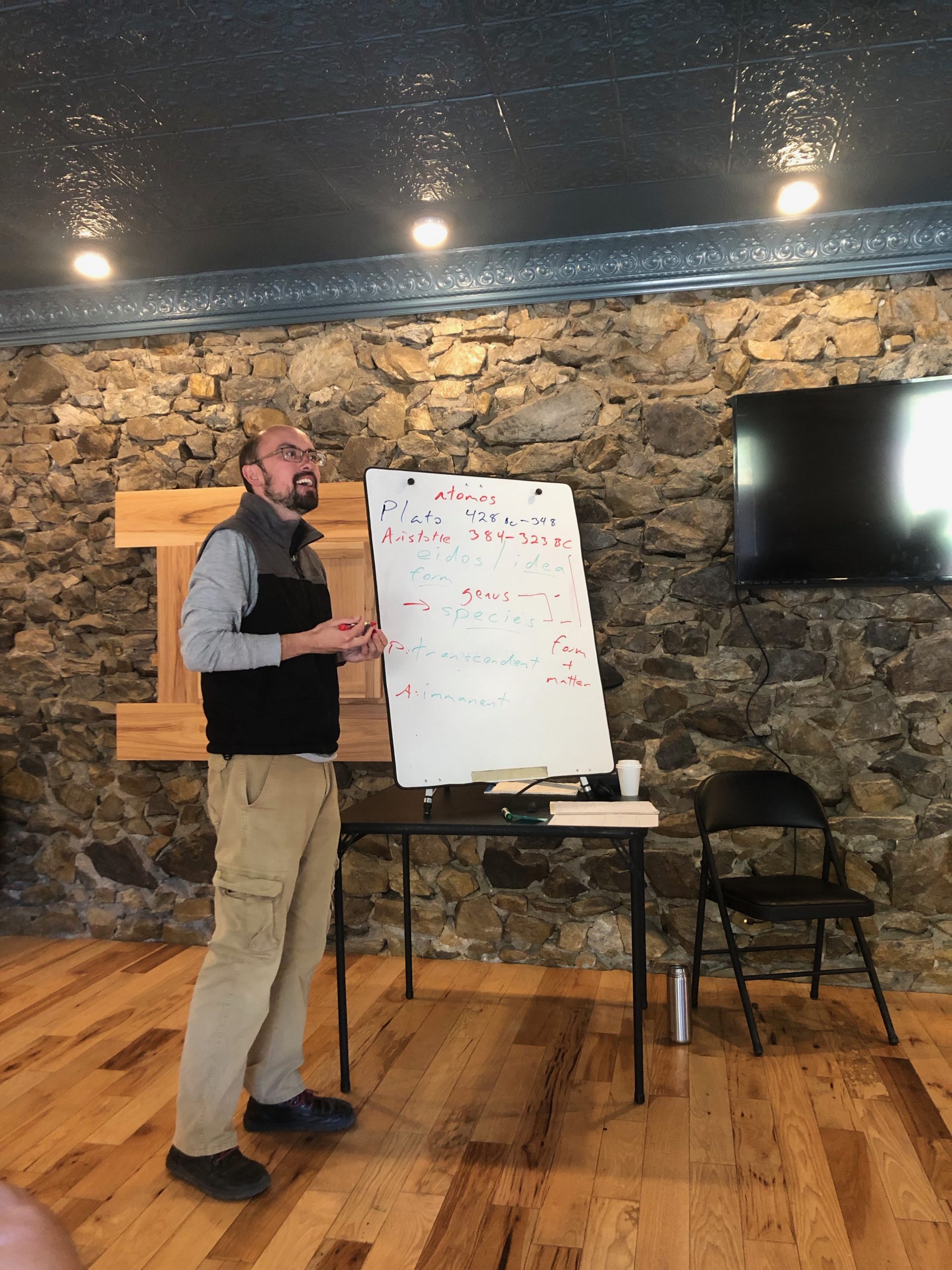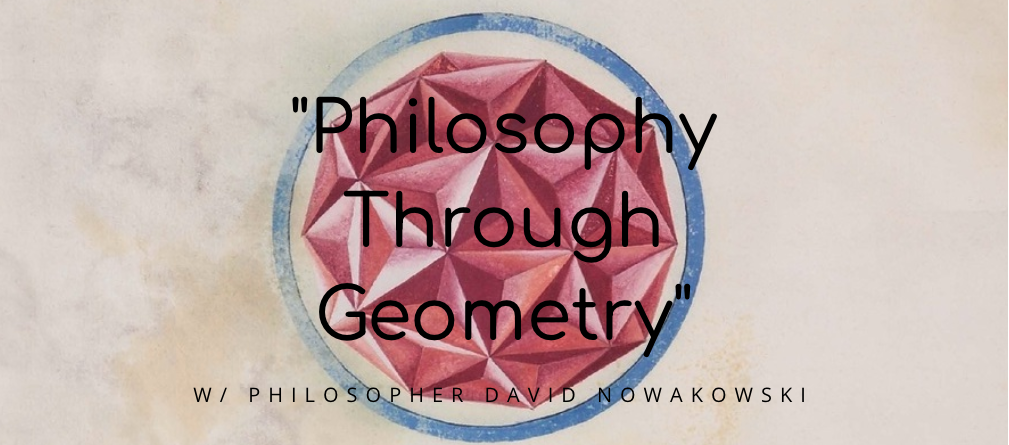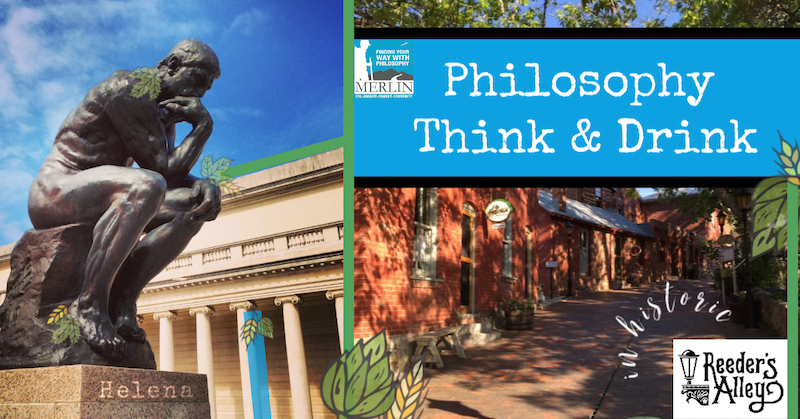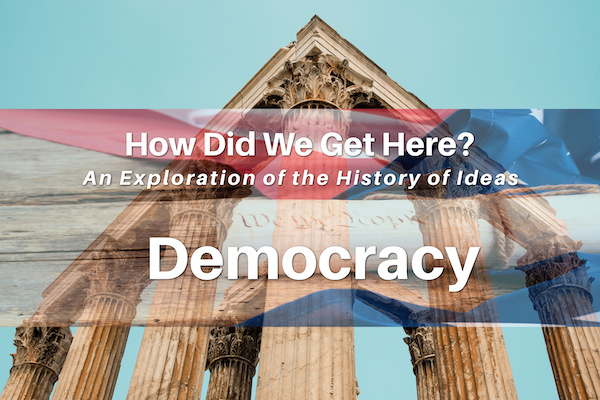
- This event has passed.
Class Series: Philosophy Through Geometry
March 22, 2022 @ 6:30 pm - 8:30 pm MST
Class Series Description
Update: As of 3/03, there are no more seats available. Our class series is officially full.
Ancient authors tell us that, at the door to Plato’s Academy, there was a sign which read “Let no one who does not geometrize enter here.” Regardless of the literal truth of that story, the practice of geometry clearly held an important place in the Academy, and in the ancient Greek philosophical tradition more generally. Over the course of four weeks together, we’ll explore some of the reasons why.
We see geometric themes throughout Plato’s dialogues: from the divided line of the Republic; to the extended scene in the Meno where Socrates helps an uneducated servant solve challenging geometric problems; and throughout the Timaeus, which begins with Socrates asking “One, two, three; where’s the fourth?”, and proceeds to the harmony of the celestial spheres, and the construction of fire, air, water, and earth from special triangles!
This exploration will combine hands-on, practical, collaborative work in doing geometry, with philosophical reading and reflection on what we’re doing, and why it matters.
In order to take seriously the message on the sign, each and every week, we’ll combine four different elements:
- Practical exercises in geometry: constructing figures with a pencil, straightedge, and compass, in order to discover and demonstrate geometric and philosophic truths.
- Short readings from the dialogues of Plato, where we see the application of geometric methods and ideas in philosophy.
- Ideas drawn from other ancient philosophers like Aristotle, Euclid, Iamblichus, and Proclus, who explicitly reflect on the place of geometry within philosophy.
- Lively and active conversation and collaboration, as a community of learners, exploring together the interplay of these philosophical and geometrical themes.
In other words, we’ll geometrize, and we’ll reflect on why we’re doing so.
Some of our important themes and questions will include:
- The ethos of geometry: What is it like to geometrize, especially when we’re working together in a community? We’ll see that for the ancients, rather than being a competition, or something done by private individuals alone in their rooms, geometry was a community practice.
- Why is geometry so special, compared to all the other arts and sciences? We’ll see how this geometry has a special way of bridging the gap between other branches of knowledge.
- The relation between geometric truths and metaphysical truths—the fundamental realities that create, sustain, and explain the cosmos. How can the interplay between bound and infinite, definite and indefinite, which gives order and structure to geometry, also help us to explain the well-ordered world in which we live?
- The “flash of insight” that is so essential to both geometric discoveries, and to philosophical wisdom, as the Platonic tradition understands it. Think of Archimedes jumping out of his bathtub and running naked through the city, shouting “Eureka!” … but keeping our clothes on!
- The methods and approaches of geometry: How does a geometer approach a new problem, and how can similar methods be used more broadly by philosophers? How can doing geometry help us to notice and appreciate the harmony of nature?
Through all of this active, collaborative practice, we will first and foremost be trying to “think ourselves into” the mindset of the Platonic tradition of philosophy, for whom geometry was so highly valued. Some of the ideas we consider may seem foreign or counter-intuitive, while others may be quite familiar. We’ll be trying these ideas on, not as some final dogma that anyone should blindly accept, but as something worth exploring on its own terms, to see what unexpected vistas it might lead us to.
Our goal is that we will all come away with a new perspective and deeper appreciation for geometry and the ancient traditions of philosophy.
Is This for Me?
If you’ve read this far, then probably yes! There is no special background or experience required, just a willingness to explore unfamiliar ideas, in the company of other eager seekers for truth.
This is not a “math class.” There will no algebra. There won’t even be any numbers higher than we can count on our fingers. If Meno’s untutored servant can do it (in Plato’s dialogue of that name), then so can we!
The practical exercises will not involve measuring anything, or doing any kind of complex arithmetic. The exercises are primarily visual and tactile: draw a line that connects A to B, draw a circle around this point, use a ruler to extend the side of this triangle, and then reflect in conversation about what we’ve done, and what it teaches us.
While the program is primarily geared toward adults, curious and responsible teenagers are warmly welcome with a parent or guardian.
What Do I Need?
Just curiosity, eagerness to learn, and respect for the ancient authors and our fellow learners. We’ll provide each participant with the basic tools:
- Pencils
- A compass (for drawing circles)
- A straightedge (for drawing lines)
- Paper (to do the drawing on)
We’ll also provide a printed handout each week, with one or more short readings from Plato that we’ll be looking at together. All of these tools will be yours to take home and keep, if you so desire.
If you can manage it, we’ll ask for a small donation to help with the cost of materials and preparation. But everyone of good will is warmly welcome, with or without that donation.
Topics & Readings
There is no required “homework” outside of our weekly meetings. All the readings will be very short (a few pages or less), and we’ll introduce them together, during the session.
Tuesday, March 8th — The Geometric Ethos
In-Class Readings: Selections from Plato’s Meno and Phaedo.
- Learning as recollection.
- Simple geometric constructions: circles, triangles, hexagons.
Tuesday, March 15th – Limit and the Unlimited
In-Class Readings: Selections from Aristotle’s Metaphysics, Book I; and from Plato’s Philebus.
- The Pythagorean “Table of Opposites”
- Point, line, plane, and figure
- Parallels and perpendiculars.
Tuesday, March 22nd — The Divided Line and the Golden Section
In-Class Readings: Selections from Plato’s Republic, Book VI (and, time permitting, from Plato’s Timaeus).
- Different kinds of “knowing”
- Geometric and harmonic proportions
Tuesday, March 29th — Traditional Methods of Proof
In-Class Readings: Selections from Plato’s Republic, Book VII; and from Euclid’s Elements, Book I.
- The ordering of the various sciences
- “Elements” in geometry and beyond
The pace and order of topics may change, based on the needs and interests of our group.
When & Where
This series will be held for four consecutive Tuesdays on March 8th, 15th, 22nd & 29th (6:30pm-8:30pm). Each class will build on one another. To that extent, registration will end on March 8th, prior to the first class, with the expectation that those sign-up will be committing (to the extent possible) to all four classes in the series. No prior background in philosophy is required to participate.
Workshop Details
Date(s): Tuesdays, March 8th, 15th, 22nd & 29th
Time: 6:30pm-8:30pm
Location: Reeder’s Alley Interpretive & Convention Center
Registration Info
Registration: No more seats available as of 3/03; our class is officially full
Cost: Free (Donations Welcome to help with cost of materials and preparation)
Class Series Leader

David Nowakowski is as a philosopher and educator in the Helena area whose professional work is dedicated to helping people of all ages and backgrounds access, understand, and apply the traditions of ancient philosophy to their own lives. David began studying ancient philosophies and classical languages in 2001, and has continued ever since. A scholar of the philosophical traditions of the ancient Mediterranean (Greece, Rome, and North Africa) and of the Indian subcontinent, reading Sanskrit, Latin, and classical Greek, he earned his Ph.D. in philosophy from Princeton University in 2014. His work has appeared in a variety of scholarly journals, including Philosophy East & West, Asian Philosophy, and the Journal of Indian Philosophy; as well as in presentations to academic audiences at Harvard, Columbia University, the University of Toronto, Yale-NUS College in Singapore, and elsewhere.
After half a decade teaching at liberal arts colleges in the northeast, David chose to leave the academy in order to focus his energies on the transformative value of these ancient philosophical and spiritual traditions in his own life and practice, and on building new systems of education and community learning that will make this rich heritage alive and available to others.
Register Information
Update: As of 3/03, there are no more seats available. Our class series is officially full.
Make a Donation Here
This class series is FREE. That said, for those who still have the steady income to do so, we could really use your financial support. Donations for this series will help to cover costs for materials, preparation, and class leader honoraria. You can make a donation by clicking here or on the button above.
Details
- Date:
- March 22, 2022
- Time:
-
6:30 pm - 8:30 pmMST
- Series:
- Class Series: Philosophy Through Geometry
- Event Categories:
- Philosophy Night School, Philosophy Workshops
- Event Tags:
- Aristotle, cosmos, david nowakowski, Euclid, geometry, harmony, merlin ccc, metaphysics, nature, philosophy, philosophy as a way of life, philosophy in the community, Plato
Venue
- Reeder’s Alley Interpretive & Convention Center
-
101 Reeder's Alley
Helena, MT 59601 United States + Google Map
Organizer
- Marisa Diaz-Waian
- Phone
- 406-439-5788



